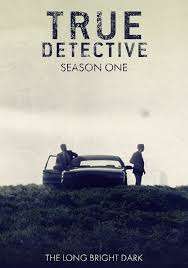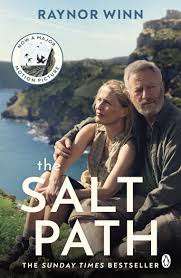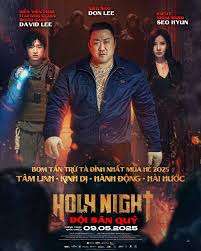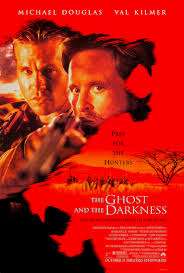Mike Nichols’ Closer (2004) is a film that pulls no punches in its exploration of love, lust, and the raw, often ugly truth of human relationships. Based on Patrick Marber’s play of the same name, the film is a character-driven drama that delves deep into the complexities of attraction, deception, and heartbreak. With a stellar cast featuring Julia Roberts, Jude Law, Natalie Portman, and Clive Owen, Closer is an unflinching examination of modern romance that captivates with its sharp dialogue, compelling performances, and bleak but realistic portrayal of intimacy and betrayal.
The Story: Love, Lies, and the Search for Truth
Closer follows the intertwined lives of four individuals—Alice (Natalie Portman), a young American stripper seeking love and identity; Dan (Jude Law), a struggling writer with a tendency to romanticize and manipulate; Anna (Julia Roberts), a photographer caught between passion and morality; and Larry (Clive Owen), a blunt but emotionally intense dermatologist. The film tracks their tumultuous relationships over several years, as they fall in and out of love, cheat, and hurt each other in ways that feel painfully real.
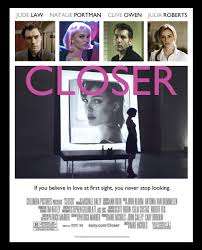
The film opens with a chance meeting between Alice and Dan, leading to a relationship. Dan, however, becomes infatuated with Anna, leading to an affair that sets off a chain reaction of betrayals. When Larry, through an amusing but cruel deception by Dan, enters Anna’s life, he too falls in love with her. The four characters become entangled in a vicious cycle of attraction and rejection, all while questioning what love truly means. Each interaction between them is charged with intensity, exposing their desires, vulnerabilities, and the brutal honesty that often accompanies deep emotional connections.
Strengths: A Masterclass in Acting and Dialogue
One of Closer’s greatest strengths is its screenplay. Patrick Marber’s adaptation of his own play retains the razor-sharp dialogue that made the stage version so powerful. The conversations between the characters are raw, intelligent, and sometimes painfully direct. There is no room for fluff or sentimental clichés—every line serves a purpose, cutting deep into the psychology of the characters and the audience alike.
The performances are equally stellar. Natalie Portman delivers one of her best roles as Alice, balancing innocence and experience with a sense of mystery. Her transformation throughout the film is subtle yet profound, making her the most enigmatic and emotionally resonant character. Jude Law plays Dan with a mix of charm and selfishness, perfectly embodying the role of a man who craves love but doesn’t know how to handle it. Julia Roberts, while more restrained, provides depth to Anna’s internal struggles, portraying her as a woman torn between desire and morality.
However, it is Clive Owen who steals the film. His portrayal of Larry, a man who is both cruel and heartbreakingly vulnerable, is electrifying. Owen’s ability to shift between charm and aggression makes Larry the most complex and unpredictable character. His scenes, particularly those with Roberts and Law, are some of the most intense in the film.
Themes: The Brutality of Love
At its core, Closer is a film about the difficulty of sustaining love in a world where people are constantly searching for something more. It explores themes of infidelity, manipulation, and the self-destructive nature of desire. The film does not offer easy answers or happy endings; instead, it presents relationships as a battlefield where honesty and deception coexist in a twisted dance.

Unlike traditional love stories, Closer does not shy away from the ugliness of human connection. It exposes how people hurt each other, sometimes intentionally, sometimes out of selfishness or fear. It asks difficult questions: Is love ever truly selfless? Can passion and trust coexist? The film refuses to provide comforting resolutions, instead leaving the audience with an unsettling but honest depiction of modern romance.
Direction and Cinematography: Intimacy Through the Lens
Mike Nichols, known for films like The Graduate (1967) and Who’s Afraid of Virginia Woolf? (1966), is a master of character-driven storytelling. In Closer, he creates a visually restrained but emotionally explosive film. The cinematography, with its close-ups and lingering shots, emphasizes the intimacy and emotional weight of each conversation. The film often isolates characters within the frame, highlighting their loneliness and the emotional walls they build around themselves.
The use of lighting and color is also subtle but effective. Many scenes are bathed in muted tones, reflecting the melancholy and cynicism that permeate the story. The film’s settings—photography studios, strip clubs, sterile apartments—serve as metaphors for the emotional states of the characters, reinforcing the themes of exposure, performance, and hidden truths.
Weaknesses: Cold and Unforgiving
For some viewers, Closer may come across as too cynical or emotionally detached. The characters, while complex, are often unsympathetic, making it difficult for audiences to fully invest in their struggles. The film’s structure, jumping through time with little exposition, can also be jarring, requiring viewers to piece together the timeline of events through dialogue and subtle clues.
Additionally, because Closer is adapted from a play, its theatrical roots are evident. Some scenes feel like extended monologues rather than organic conversations, which might make the film feel somewhat artificial to those unfamiliar with its stage origins. However, for those who appreciate sharp, dialogue-driven dramas, this is more of a strength than a weakness.
Verdict: A Powerful but Uncomfortable Experience
Closer is not an easy film to watch, but it is a rewarding one. It is a brutally honest exploration of love, showcasing the pain, deception, and fleeting moments of genuine connection that define modern relationships. With exceptional performances, sharp writing, and masterful direction, it remains one of the most thought-provoking relationship dramas of the 21st century.

While it may not be for everyone—especially those who prefer more optimistic portrayals of love—it is undeniably powerful, offering a rare, unfiltered look at the complexities of human emotion. It leaves the audience questioning not just the characters’ choices, but also their own perceptions of love, loyalty, and truth.
Final Rating: 9/10
